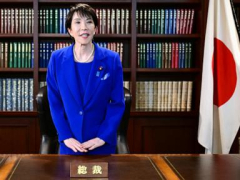TOKYO — TOKYO (AP) — Sanae Takaichi is on track to become Japan’s first female prime minister, after her governing party secured a crucial coalition partner.
Takaichi, 64, is set to replace Prime Minister Shigeru Ishiba in Tuesday’s parliamentary vote. If she’s successful, it would end Japan’s three-month political vacuum and wrangling since the coalition’s loss in the July parliamentary election.
The moderate centrist Komeito party had split from the ruling Liberal Democratic Party after a 26-year-long coalition. It came just days after Takaichi’s election as LDP leader, and forced her into a desperate search for a new coalition partner to secure votes so that she can become prime minister.
The Buddhist-backed Komeito left after raising concerns about Takaichi’s ultraconservative politics and the LDP’s lax response to corruption scandals that led to the party’s consecutive election defeats and loss of majority in both houses.
While the leaders of the country’s top three opposition parties failed to unite to seek a change of government, Takaichi went for a quick fix by teaming up with the most conservative of them: the Osaka-based Ishin no Kai, or Japan Innovation Party. The two parties on Monday signed a coalition agreement that includes joint policy goals on diplomacy, security and energy.
The fragile new coalition, still a minority in the legislature, would need cooperation from other opposition groups to pass any legislation.
Big diplomatic tests await the government within days — talks with U.S. President Donald Trump and regional summits. At home, Takaichi needs to quickly tackle rising prices and come up with economic stimulus measures to appease the frustrated public.
An admirer of former U.K. Prime Minister Margaret Thatcher, Takaichi’s breaking of the glass ceiling makes history in a country whose gender equality ranks poorly internationally.
But many women aren’t celebrating, and some see her impending premiership as a setback.
“The prospect of a first female prime minister doesn’t make me happy,” sociologist Chizuko Ueno posted on X. Ueno said that Takaichi’s leadership would elevate Japan’s gender equality ranking, but “that doesn’t mean Japanese politics becomes kinder to women.”
Takaichi, an ultraconservative star of her male-dominated party, is among those who have stonewalled measures for women’s advancement. Takaichi supports the imperial family’s male-only succession, opposes same-sex marriage and a revision to the civil law allowing separate last names for married couples, so women don’t get pressured into abandoning theirs.
“Ms. Takaichi’s policies are extremely hawkish and I doubt she would consider policies to recognize diversity,” said Chiyako Sato, a political commentator and senior writer for the Mainichi newspaper.
If sh





